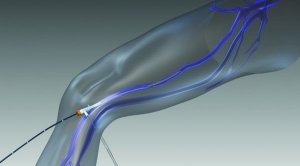What Are Possible Side Effects with Vein Therapies?
Vein Therapies, whether for leg veins, foot & ankle veins, or facial vein, have become much safer over the years. This is due to advances in modern technologies that did not exist before or from improvement in more traditional therapies. Examples include the development of new laser devices, invention of safer catheter technologies such as radiofrequency catheters, smaller instrumentations due to fiber optics and laparoscopy, and the development of new medications and chemical substances that can replace the need for prior more-invasive procedures or surgeries. Improvements in imaging, such as higher definition ultrasound machines, CT scans, and MRIs has also aided vein specialists to treat vein diseases with less invasive options.

Still, even with these less invasive procedures there is still going to be risks involved. All interventional therapies are associated with risks of complication. The risks have just decreased. I will discuss some of the possible risks associated with commonly performed vein procedures that are discussed on the pages of our website.
Risk of All Invasive Procedures
Any invasive procedure, whether to a vein or other structure, have potential risks, complications, or side effects. This can include bleeding, scarring, infection, blood vessel injury, blood clots, nerve injury, or accidental injury to other adjacent structures. New abnormal veins can also develop after vein procedures. Lymphatic damage or chronic swelling can sometimes result. Most vein procedures go well, but there is also the possibility of an adverse side effect or complications. A very rare potential complication is a retained foreign body as a result of catheter, wire, sheath, or IV breakage or dislodgment during the procedure.
Possible Side Effects of Lasers
Lasers include diode lasers used for Endovenous Laser Treatment (EVLT), but also other other laser devices such as YAG lasers. The risks of vein lasers include thermal injury to the skin, manifesting as skin burns. This is a rare occurrence due to lower levels of laser heat being delivered with these procedures. If you develop this complication you may develop scarring or change in the pigmentation of the skin at the treatment area involved. The pigmentation changes in the skin could be darker or lighter than the adjacent uninvolved skin. Contact your physician if you believe this complication has occurred. By seeing a board-certified vein specialist with experience in laser vein treatments you will minimize your chance of complications occurring. It is also advised that a physician perform the actual laser vein procedure.
Other risks of lasers result from the laser heat energy involved with the laser device. This can include heat damage to nerves or soft tissues adjacent to the veins. Soft tissues include the muscles, ligaments, tendons, and adipose tissue (fat) adjacent to the veins. The skin is the most commonly affected area. Nerve injuries an lead to chronic pain or numbness.
If deeper veins are treated, other risks or side effects are possible. This can include blood clots (deep venous thrombosis or superficial venous thrombosis) or damage to deeper veins as the result of scar. In more severe cases of blood clots there can be movement or embolization of the clot. The most common area for a clot embolism to travel is the lungs.
If you develop any unusual symptoms after a vein procedure, immediately contact your physician or go to the nearest emergency room to be evaluated. Ultrasounds and CT scans can be done to evaluate for possible blood clots. It is very routine to have a vein ultrasound performed following a procedure to evaluate for any complications, side effects, or blood clots. You should also receive a follow up physical examination by your vein specialist after any vein treatment to ensure that no unusual side effects or complications have occurred.
Safety goggles should be worn during laser procedures to protect the eyes / retina. So your vein specialist will ask you to wear safety goggles while laser procedures are being performed.
Possible Side Effects of Radiofrequency Ablation Therapy
Radiofrequency Ablation (RFA) includes procedures like ClosureFast, Venefit, and VNUS procedures. RFA is a type of thermal treatment, so side effects are typically related to heat delivery to adjacent structures. These side effects include thermal injury to the skin, nerves, muscles, or other soft tissues next to the vein. This can lead to discoloration of the skin, scars, numbness, tingling, or chronic pain of the treated area. Blood clots or injury to adjacent veins or blood vessels can occur. Bleeding is another possible complication. Since veins are under low pressure, most cases of bleeding from leg veins that results from superficial venous procedures is minor and can be controlled by direct pressure or a suture.
Possible Side Effects of Sclerotherapy
Sclerotherapy risks include allergic reactions or drug related side effects (exact nature depends on which sclerosant drug is used). Skin related side effects include abnormal skin pigmentation, matting (abnormal vein development), blood clots, bleeding, skin wounds / ulcers, scarring, injury to adjacent vessels, and pulmonary embolism. Extravasation of the drug into other tissues around the treatment area or accidental injection into other blood vessels (such as arteries) can lead to other tissue damage, pain, scars, or treatment failure. The most common side effect of sclerotherapy is hyperpigmentation of areas of skin at or near the treatment sites. Hyperpigmentation usually resolves with time, but can sometime takes many months or even up to a year to resolve.
Possible Side Effects of Varithena
Since varithena is a type of sclerotherapy treatment, the risks are the same as those described for sclerotherapy above.
Possible Side Effects of Venaseal
Venaseal is a medical glue that is injected into veins. Side effects can include medication allergy, abnormal inflammatory response of the tissues surrounding the treatment site, infections, chronic pain, injury to adjacent blood vessls, injury to adjacent soft tissues or organs. Other possibilities include bleeding and abnormal vein development adjacent to the treatment sites.
Possible Side Effects of Clarivein
Clarivein is a combination of mechanical disruption of a vein and use of a sclerosant drug. So the risk include those described for sclerotherapy. Other possibilities include bleeding, scarring, infection, blood vessel injury, blood clots, nerve injury, or accidental injury to adjacent structures. New abnormal veins can also develop after vein procedures. Most vein procedures go well, but there is also the possibility of an adverse side effect or complications. A very rare potential complication is a retained foreign body as a result of catheter, wire, sheath, or IV breakage or dislodgment during the procedure.
Possible Side Effects of Phlebectomy and Stripping and Vein Ligation Surgeries
These are open surgical vein procedures to remove or ligate abnormal veins. They are still performed today for more severe forms of varicose veins. Risks include bleeding, scarring, infection, blood vessel injury, blood clots, nerve injury, chronic swelling, lymphatic damage, or accidental injury to other adjacent structures. New abnormal veins can also develop after vein procedures. Most vein procedures go well, but there is also the possibility of an adverse side effect or complications.
Other Vein Procedures & Risks Not Categorized Above
The above categories of vein treatments cover the majority of the vein procedures performed at Austin Vein Specialists. But this list is not all inclusive of all vein procedures available or of other possible rare side effects. A one-on-one discussion of the risks involved with your specific procedure and your specific anatomy should occur between you and your physician before a vein procedure is performed. Both verbal and written consent between you and your doctor is advised before you undergo a vein procedure. It is also advised that you have have your vein condition treated by a physician that is board-certified in vein disease management (i.e Vascular Surgeon) and that this doctor has successfully completed a residency and fellowship in vascular surgery. This ensures the highest level of competency of the physician and helps to minimize your risks of adverse side effects and complications.


